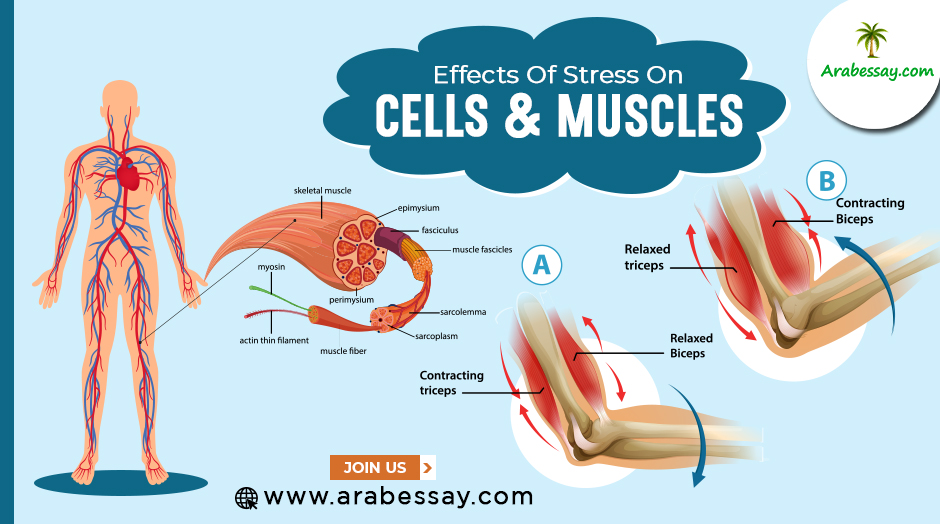Effects Of Stress On Cells And Muscles

Whether it is an intrinsic or extrinsic stimulus, the compensatory biological responses to stressors are always based on the type or severity of stimuli. For a long time, researchers have suggested that hormones present just in peripheral tissues responded to these stimuli. But with time, researches are still going on to uncover what dimension of the body actually performed to calculate stress level or how it combats stress.
Around 50 years ago, the effects of stress on endocrine systems were discovered. Many studies have noted down structural changes abundantly when stress suspected at a huge level. Chronic stress leads to decreases in brain size and its weight brings out changes in cognitive memory. However it is not understood according to duration and time, stress causes structural changes of cells, muscles and brain. Therefore it becomes highly important for the researchers to take account effects of stress on cells, muscles and nervous system. In this article, we are going to determine the affinity of stress to biological functions.
Cellular Stress Responses
Cells respond to external stimuli or stress in a variety of ways ranging from pathway activation to signalling or eliciting death cells (HealthOne, 2020). The initial response of cell towards stress is to gear up or helping cell in defending. Depend on the severity and longevity of stress, cells would survive to promote cell survival.
When a person experiencing stress, it is more likely their energy will slow down. This is resulted due to mitochondria”{Power house of the cell} damages. It activated fight and flight response.
Stress is responsible for breaking of mitochondrial DNA into bloodstreams that in turn acts similarly as hormones. In a view of essay Deutsch, due to prolonged stress, alteration of DNA may have suspected in patients causing impairment in function or promoting cancerous cell growth, However, some evidence still required in the case of alteration of DNA due to stress.
In an outlook of Yaribeygu et.al, 2017, a high concentration of stress hormones causes declarative memory disorders. When a study conducted on animals, researchers came to know a reduction in spatial memory found to be in an animal as results of hippocampus atrophy. In other case, people having Cushing’s syndrome observed to have atrophy syndrome.
Stress also has a negative impact on learning. In many cases, it has seen adrenal steroids alter long term potentiating which is a critical component of memory.
But in many cases, we have found stress is not always decreased memory. In fact in a certain situation, it can improve memory. The conditions include non-familiarities, life-threatening aspects imposed by stimuli. For instance, if a student appears in written examination, in a high-stress level, students would write and try harder to memorize everything related to concepts. But if due to job stress, you are unable to complete assignments on time, then ArabEssay based essay writer is the best option for you as they can give flawless write-ups in no time.
Stress And Endocrine System
There is broad and the mutual relationship has been seen among stress and endocrine system. Stress has a hardcore impact on system operation also at some stance system affects the severity of stress. Stress in both the cases either changes activity of the hypothalamus, pituitary gland, adrenal glands, gonads, thyroids etc or activates these glands(Picard et.al, 2017). Thierry et al have suggested this would be impossible to separate endocrine functions and stress. In the different location of this blog, we have also discussed the effects of stress on hormones at a border perspective.
Stress And Gastrointestinal Complication
The effects of stress on the gastrointestinal system occur in two aspects. First, it affects appetite and seconds it affects the normal functioning of the GI tract. Stress increases GI system responses also may reactivate inflammation via secreting P substance. A detailed table stress effects on the GI system have been proposed in given below section with help of online assignment help experts-
| Stress effects on GI system | Area and receptors being involved | Effects in Details |
| Modifying Appetite | Amygdala, Ventral tegmental area | Reduces food and water intake |
| GI tract movement | CRH-2 and CRH-1 receptors | Preventing stomach emptying decreases initial part of GI tract |
| Digestive functions | Parasympathetic functions | Modify absorption |
| GI system inflammation | T- lymphocytes | Increases inflammation by P substance |
In case you want more details about the table and proposed researcher, get quality assignment in UAE you can get in touch with ArabEssay instant essay help team today.
Conclusion
In this blog, we have discussed the effects of stress on cell and brain activity by covering a wide range of research papers. In this context, we can say that stress includes both beneficial and harmful effects. However, in many cases, its harmful effects attributed to more attention for instance stress is responsible for breaking of mitochondrial DNA into bloodstreams that in turn acts similarly as hormones or Stress increases GI system responses also may reactivate inflammation via secreting P substance. Also one of its beneficial impact we have figured out is conditions include non-familiarities, life-threatening aspects imposed by stimuli enhances memory at times.
References
HealthOne(2020). the impact of stress on cellular level. Available at- https://scholar.google.com/scholar?hl=en&as_sdt=0%2C5&as_ylo=2017&q=the+impact+of+stress+on+cellular+level&btnG=
Picard, M., McEwen, B. S., Epel, E. S., & Sandi, C. (2018). An energetic view of stress: focus on mitochondria. Frontiers in neuroendocrinology, 49, 72-85.
Thierry A-M, Javoy F, Glowinski J, Kety SS. Effects of stress on the metabolism of norepinephrine, dopamine and serotonin in the central nervous system of the rat. I. Modifications of norepinephrine turnover. J Pharmacol Exp Ther. 1968;163:163–171
Yaribeygi, H., Panahi, Y., Sahraei, H., Johnston, T. P., & Sahebkar, A. (2017). The impact of stress on body function: A review. EXCLI journal, 16, 1057.